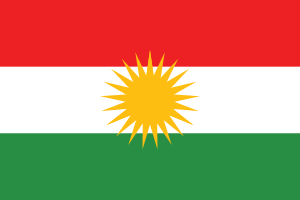Kurds in Japan
| Total population | |
|---|---|
| 300- 400[1] | |
| Regions with significant populations | |
| Warabi, Kawaguchi | |
| Languages | |
| Japanese, Kurdish |
Kurds in Japan (Japanese: 在日クルド人 Zainichi Kurudo-jin) refers to Kurdish people residing in Japan.
Legal status
Most Kurds in Japan are from shepherding villages in Southeast Turkey and reside in the Warabi and Kawaguchi areas of Saitama Prefecture, north of Tokyo. Warabi, especially, has been nicknamed "Warabistan"[2][3] by those who are interested in Kurdish people, culture, and issues. Many Kurdish people arrived in Japan in order to request refugee status due to human rights abuses in Turkey, but so far none have been successful in their application. While many obtain visas through marriage with a Japanese citizen, most have obtained "Special Permission to Stay" (在留特別許可 Zairyū Tokubetsu Kyoka) visas, which must be renewed every three months while their refugee application or appeal is being reviewed. Those Kurdish immigrants, who have their appeals rejected but refuse to be deported, will typically spend time (usually six to eighteen months) in the Shinagawa (in Tokyo) or Ushiku (in Ibaraki) immigration jails. A documentary directed by Masaru Nomoto (野本 大) entitled Backdrop Kurdistan (バックドロップ・クルディスタン) documented the legal struggles of one Kurdish family (Kazankıran family: Japanese: カザンキラン Kazankiran[4]) from Kahramanmaraş Province.
Language
Most Kurdish residents in Japan speak a combination of Kurdish (particularly the Kurmanji dialect) and Turkish. Their ability to converse in the latter is largely dependent on how many years of education they received in Turkey. Most Kurdish men learn to speak Japanese in order to find work; Kurdish women, mostly confined to the home, may learn only basic greetings. Kurdish children born or raised from an early age in Japan often grow up trilingual: learning Kurdish and Turkish from their parents and absorbing Japanese from watching television and their local neighborhood.
Celebrating Kurdish identity in Japan
Kurds residing in Japan take advantage of cultural freedoms they are not openly permitted in Turkey by displaying Kurdish flags, listening to Kurdish music, speaking Kurdish, and celebrating Newroz. They may also give Kurdish names like "Roni" or "Rohat," which mean "the sun will rise," to their children who are born in Japan. These names are forbidden in Turkey due to their political implications (the flag of Kurdistan, banned in Turkey, features a sun). Newroz, the New Year celebration that is often an occasion for violence in Turkey, is celebrated openly and peacefully in Japanese parks.
Sources
- ↑ http://www.geocities.jp/kuludojp/nyuumon/nyuumon.html
- ↑ Chie Matsumoto, "Kurds live lives interrupted", Kurdish Media, original: Asahi Shimbun, April 30
- ↑ ワラビスタン~日本のクルド人 (Warabistan - Nihon no Kurudo-jin), Asahi Shimbun, December 15, 2005. (Japanese)
- ↑ Backdrop Kurdistan, goo Eiga. (Japanese)
See also
- Kurdish diaspora
- Newroz
External links
| ||||||||||||||||||||||||
